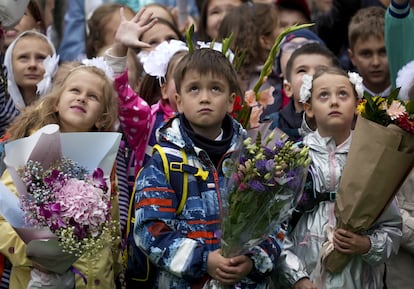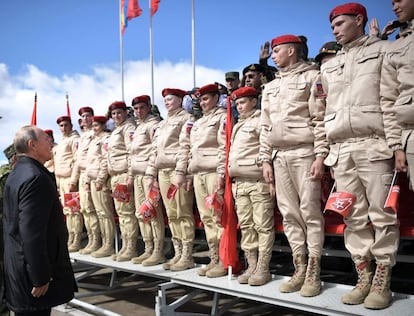Firing assault rifles and throwing grenades: Russia plans to prepare students for war
Vladimir Putin’s government has announced a proposal for compulsory basic military training in high schools, including the handling of weapons, first aid and trench-digging


Schools in Russia will no longer only teach young students that “there is nothing to fear in dying for the Motherland,” as stated by a compulsory activity added to the curriculum this academic year entitled Important Conversations. They will also show teenagers how to kill for their country. The government of Vladimir Putin is planning to introduce a new mandatory subject at school that will prepare children for war. During these classes, according to the first drafts on the proposal, students will be taught skills including how to handle assault weapons and the treatment of burns caused by explosions. The project has the backing of the Ministries of Defense and Education and political parties aligned with the Kremlin, who see the introduction of this subject in schools as a good job opportunity for veterans of the war in Ukraine.
The Russian military’s chief of the general staff, Valery Gerasimov, told Sergey Mironov, the leader of the pro-Kremlin A Just Russia – For Truth political faction: “Taking into account the relevance of the issue under consideration, the proposal to introduce the subject of Basic Military Training as a compulsory subject in secondary education courses is worthwhile and should be supported.” Mironov believes the lessons will prepare the next generation for future wars, as the politician noted that in the Ukraine conflict “many do not have the experience needed to participate in hostilities.” It would also provide employment for “tens of thousands of people who love Russia and at the same time are masters of the theory and practice of warfare.”
Russia’s Deputy Minister of Education Tatiana Vasilieva announced on Tuesday that her department is developing basic training course but within a framework of “only” 35 hours to be spread out over five days, the maximum length of time established by legislation governing extracurricular activities. Gerasimov, meanwhile, believes that 140 hours would be an “adequate” length for the course and that teachers, if those already in place at schools are not trained for it, should be recruited among officers and veterans with priority given to those who have seen combat, Russian daily Izvestia reported.
Such military courses already exist as voluntary activities and have been promoted within the nationalist campaign that the Kremlin has been gradually rolling out over the past few years. For example, last year the city authorities in Moscow built a military training center in Patriot Park, a theme park based on “military-patriotic education” and which has the capacity for 600 children at a time.
“Do you want to learn how to shoot a sniper rifle and throw a grenade?” the publicity on the website for the course at Patriot Park, which costs a “modest price of 5,000 rubles [$80]” reads. “We will expand your skills, boost your morale and improve your physical condition. In short, we will change your life for the better!”

Putin to head Soviet-style Pioneers movement
The initiative has won the backing of practically the entire pro-Kremlin political spectrum, which supports Vladimir Putin’s invasion of Ukraine to the hilt. Mironov wrote to the Defense Ministry to propose a subject that existed in Soviet times after the ultranationalist Liberal Democratic Party of Russia had proposed something along similar lines on the basis that children “will not only learn how to mount machine guns, but also some necessary day-to-day skills,” Deputy Chairman of the Committee on Education and Science Boris Chernyshov told Izvestia.
The Ministry of Education has proposed including the course in the final two years of school as a module withing the existing subject of Fundamentals of Vital Security. During the first year, students will be taught first aid techniques to deal with victims of severe trauma, burns and hemorrhages. In the second, they will undergo military training, learning how to handle the Russian Army’s favored AK model assault rifles and RGD-5 grenades as well as studying the composition of a BMP armored transport rifle squad and the basics of trench-digging.
The basic military training component will be added to the existing subject of Important Conversations, which was introduced on September 1 and teaches that patriotism comes before the lives of students. “Do not spare your strength nor your life for the motherland” and “The motherland’s happiness is worth more than life itself,” are among the slogans included in teachers’ manuals. The new military training course is due to be introduced at the start of the next academic year and will be trialed and tested as of January 1, Education Minister Sergey Kravtsov was quoted as saying by the TASS news agency.
Plans are also in place for a new youth movement based on the Soviet-era Young Pioneers organization, which will be headed by Putin himself to “promote the policies of the state” among children.
Sign up for our weekly newsletter to get more English-language news coverage from EL PAÍS USA Edition
Tu suscripción se está usando en otro dispositivo
¿Quieres añadir otro usuario a tu suscripción?
Si continúas leyendo en este dispositivo, no se podrá leer en el otro.
FlechaTu suscripción se está usando en otro dispositivo y solo puedes acceder a EL PAÍS desde un dispositivo a la vez.
Si quieres compartir tu cuenta, cambia tu suscripción a la modalidad Premium, así podrás añadir otro usuario. Cada uno accederá con su propia cuenta de email, lo que os permitirá personalizar vuestra experiencia en EL PAÍS.
¿Tienes una suscripción de empresa? Accede aquí para contratar más cuentas.
En el caso de no saber quién está usando tu cuenta, te recomendamos cambiar tu contraseña aquí.
Si decides continuar compartiendo tu cuenta, este mensaje se mostrará en tu dispositivo y en el de la otra persona que está usando tu cuenta de forma indefinida, afectando a tu experiencia de lectura. Puedes consultar aquí los términos y condiciones de la suscripción digital.








































